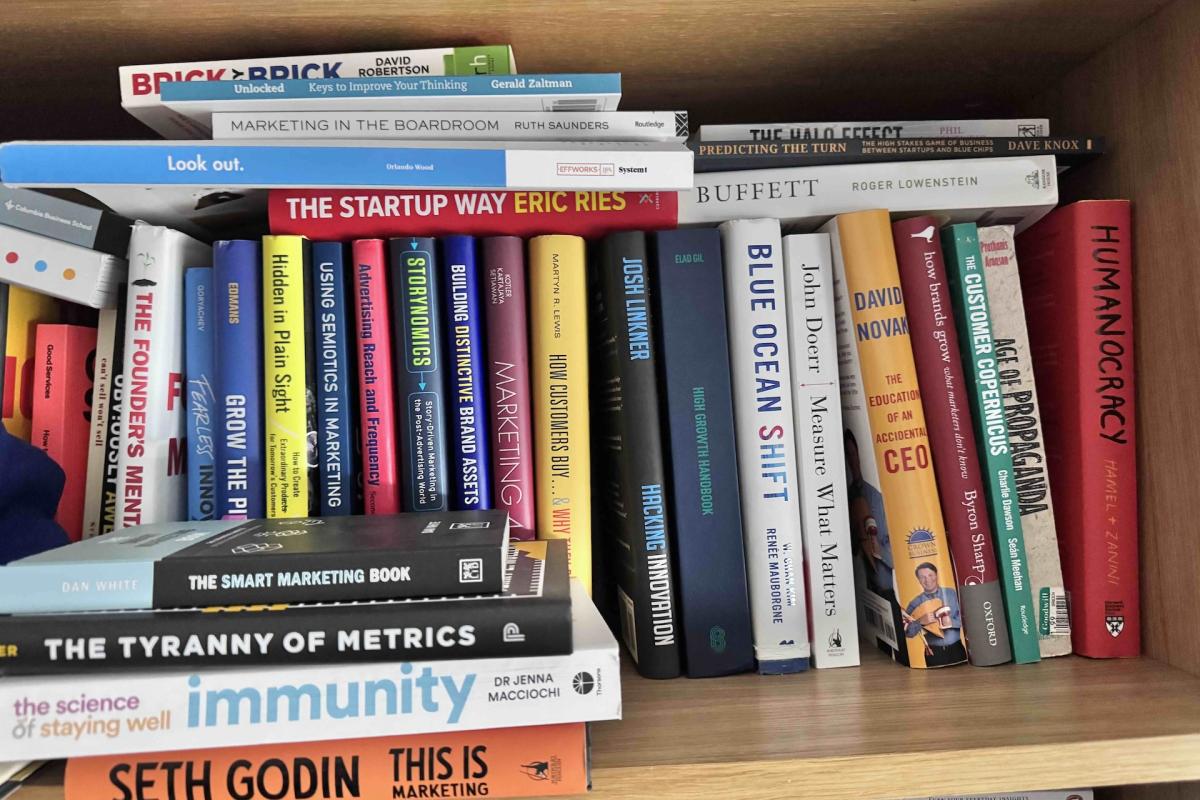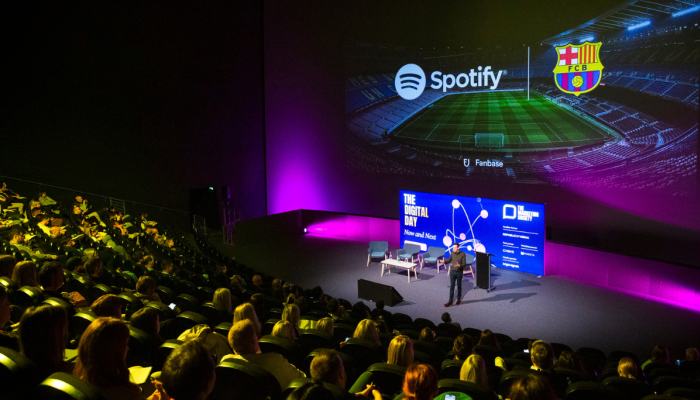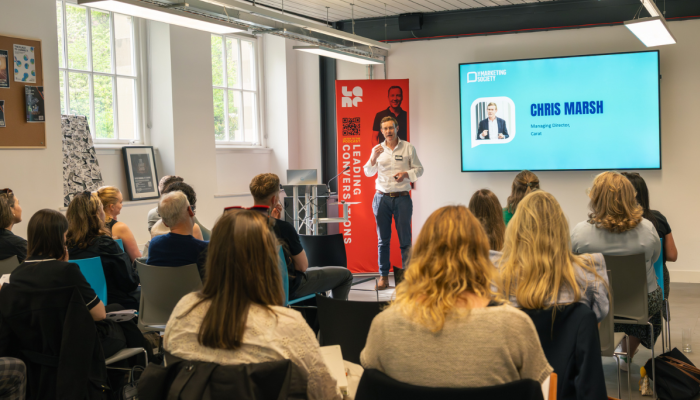May 21
The Warren Buffett Way (3rd Edition) by Robert G. Hagstrom
It’s been a big week in our house. My wife, Dr. Clara Doran, launched her own book Heads Up: How to look after your brain, so it can look after you in the UK and US. It's been a whirlwind few days and am sure it will get a summary in a future column.
However, this week’s column. The Warren Buffett Way might look like just another book about money. And yes, it is. But more than that, it’s a book about thinking clearly, staying patient, and sticking to your principles; even when the world is chasing the next big thing.
The third edition of Robert Hagstrom’s book isn’t just about how Buffett invests. It’s about how he thinks. Buffett doesn’t chase stocks, he looks for businesses he can believe in. He picks companies the way smart people might pick long-term partners: with care, patience, and a focus on the future.
Marketers today could do with a bit more Buffett.
He doesn’t follow fads. He looks for companies with staying power. A strong brand. A product people come back to. Leaders who keep their heads when others lose theirs. Sound familiar? You could say that’s what real brand-building should look like.
This book is about behaviours as much as it is about investing. Buffett ‘beats the market’ by staying calm. He ignores the noise. He waits. He doesn’t confuse movement with progress. Think of this as it applies to the world of marketing where we’re told to "move fast and break things," Buffett prefers to move deliberately and invest in things that last.
The book breaks down his approach into four areas: business, management, financials, and the market. But what sticks are the human principles: Think clearly. Stay rational. Focus on what you know. Avoid distractions. In short: use your head.
This book made be think that we should all be asking better questions of ourselves. Are we building something that lasts? Are we making it better or just busier?
Some of the lines that resonated -
- “Time is the friend of the wonderful business, the enemy of the mediocre.”
- “Inactivity strikes us as intelligent behaviour.”
- “Buy companies so wonderful that an idiot could run them, because sooner or later, one will.”
- “Our favourite holding period is forever.”
If marketing feels like a race you didn’t enter, read this. It’s not just about how to invest money. It’s about how to think straight.
Until next time,
Follow me, bring a pen.
May 14
Build the Life You Want By Arthur C. Brooks and Oprah Winfrey
Something a little different this week and I'm going to start with a question: What do you think was the one thing almost every Oprah audience member had in common over the 25 years of shows?
Oprah suggested it was they all had a desire to be happy.
Fair enough, but here’s the interesting part.
When asked what happiness actually is, most people couldn’t say or be specific. There was no shared definition. No consistent language. Just a vague sense of something better… out there… someday.
It struck me how often this happens in our industry too. Wait for my tenuous link ...
We regularly ask people what they want from a brand, or a job, a product, or even their life and the answers can be pretty bland.
So you have to dig a little deeper, and build empathy with your consumers (or stakeholders).
It's important to 'ask the second question' and ultimately be clear what you're working to and ultimately create clarity on what success looks like. Because if you can’t define it, you can’t measure it. And if you can’t measure it, you can’t build it.
That’s what makes Build the Life You Want so compelling. It doesn’t just tell you happiness is possible, it breaks it down into ingredients. It treats happiness not as a vague feeling, but as a design challenge. One you can take on yourself.
Brooks and Oprah offer a science-backed work plan that aims to start where you are today and build from there.
It talks about the macronutrients of happiness? What are they you say? Well there's three ...
-
Enjoyment (not just pleasure, but presence)
-
Satisfaction (earned, not gifted)
-
Purpose/Meaning (your reason to keep going)
Plus, the four investments that matter most? They say family, friendship, work, and faith or whatever your personal philosophy may be.
The book talks to the fact that you don’t need to wait for life to be perfect before you start living it. That hardship isn’t an interruption of the good life, it’s part of it. It can give meaning to it.
As strategists, researchers, and marketers, it’s a sharp reminder that language matters. If we don’t define what we’re looking for, we could waste time, energy, and insight chasing shadows.
Sometimes, the biggest barrier to happiness, (or insight or just plain progress) … is not having a clear definition of what we're wanting or working towards. Have a good week.
Follow me, bring a pen.
May 7
'Hard is soft. Soft is hard' from The Excellence Dividend by Tom Peters
Tom Peters doesn’t do subtle. He deals in bold type, repeatable phrases, and relentless common sense.
One of his most powerful that I have included in almost every presentation I have done since reading this book “Hard is soft. Soft is hard.”
The hard KPIs and focus of most organisations & individuals, profitability, market share movements, revenue etc are outcome metrics and are really soft metrics because what are consider the softer metrics like people, culture, energy, empathy are really the hard metrics. They're what holds companies together. Or tears them apart. They are the metrics that can have profound impact on the outcome metrics like revenue and market share growth.
In this book Peters talks to the fact that amateurs talk strategy. Professionals talk logistics. It's about doing & doing with and through people.
It’s a sharp reminder that ideas are easy; delivery is hard. That treating people well isn’t “nice to have” it’s the strategy.
He also talks about mission statements and has his own. He shares it and of course it's sharp.
People first. Listen aggressively. Wow or bust. Excellence always.
That's it. What would yours be? An interesting exercise to complete.
In a world chasing scale, Peters is obsessed with care and he suggests focusing in being great, not big. And in an industry that often celebrates cleverness, this book is a reminder that what really matters is execution, humanity, and showing up to do excellent work.
And yes it had a very high notes-to-pages ratio. Lots to underline and revisit.
Follow me and bring a pen.
April 30
At the start of The Knowing-Doing Gap, the authors, Pfeffer and Sutton note that in 1996, over 1,700 business books were published in the United States alone. They said that number was rising fast. Nearly 30 years later, the figure is almost certainly many, many times higher. Which makes it slightly ironic that I'm now summarising yet another business book. But this one earns its place.
There is a difference between knowing and doing. We all know it, and yet, that gap remains one of the biggest traps in business life. Companies don’t usually fail for lack of knowledge. They mostly fail because they don’t act on what they already know. In many organisations all over the world, talk too often substitutes for action.
The book suggests that knowledge is something you build through action. The authors tell us that "knowing comes from doing and teaching others how". I found this a powerful reminder that real understanding only takes root when we apply, share, and test what we think we know.
They also challenge the cult of perfect planning, suggesting that "enlightened trial and error outperforms the planning of flawless execution." In their view, progress belongs to those willing to act, adjust, and move forward not to those stuck waiting for certainty.
Which leads to one of the simplest and most powerful ideas in the book: "Act even when uncertain." Action, even imperfect, is almost always better than hesitation dressed up as preparation.
The lesson for marketers?
Well it’s tempting to get stuck polishing the brand framework (again), endlessly tweaking the creative strategy, waiting for perfect insight. But brands aren’t built in workshops or on paper (as Wendy Gordon once stated brands only exist in the minds of consumers). Brands are built in the real world through campaigns launched, ideas tested, mistakes made, and momentum gained.
Great marketing teams, like great businesses, learn by doing. They try, adjust, and try again. They teach each other through real work, not just through theory. They close the knowing-doing gap every day not by having the perfect plan, but by taking the next step or action.
In the end, The Knowing-Doing Gap could be viewed as a call to arms for marketers ...
Less talking about marketing.
More marketing.
Less knowing what might work.
More finding out by doing.
What do you think? Would love to hear your thoughts.
Follow me and bring a pen.
April 23
“If you want to build a ship, don’t drum up the people to gather wood, divide the work, and give orders. Instead, teach them to yearn for the vast and endless sea.” Antoine de Saint-Exupéry
Every marketer loves a manifesto. But the best ones aren’t on billboards. The best ones are quietly shaping the work from the inside out.
Netflix’s culture deck was never meant to be public. It started as a scrappy internal presentation, but over time it became a global artefact, not just for HR teams, but for anyone serious about building a high-performance, high-trust organisation. A kind of brand book for the people behind the brand.
I revisited the Netflix powerpoint for this column, alongside the book Powerful, Patty McCord’s account of what really went on behind the slides. The book presents a case for radical honesty, grown-up freedom, and something most companies claim to want but rarely know how to keep, responsibility without rigidity.
Netflix updated its culture memo last year. It’s worth looking up if you haven’t already. It reminded me that culture isn’t what’s printed, it’s what’s practised.
And this line I underlined “We suck today compared to where we want to be tomorrow.”
A ‘powerful’ willingness to make peace with the gap between ambition and reality and keep going anyway.
If you’re in marketing, that sentiment should resonate. Because we too live in that gap. Between what we planned and what went live. Between what the brief asked for and what the budget allowed. Between what we hoped for and what the team delivered under pressure.
It’s easy to obsess over brand purpose, tone of voice and campaign strategy. But culture, what we reward, what we tolerate, how we make decisions when no one’s watching that’s what shapes the work long before it ever reaches a screen or a supermarket shelf or a brochure.
Netflix doesn’t get it all right. But they’re one of the few companies willing to say that freedom’s not free. It comes with accountability. It comes with candour. And it comes with a culture of constant learning.
So maybe the question isn’t what’s our culture deck? Maybe it’s ‘What are we giving people permission to care about?
Because that more than anything will show up in the work.
What do you think? Have you read Netflix’s updated culture memo, or Patty’s book? Let us know.
Follow me, and bring a pen!
April 16
“A reader lives a thousand lives before he dies. The man who never reads lives only one.” – George R.R. Martin
Books have a way of getting under our skin.
Sometimes it’s the big ideas that stick. Other times it might just be a single sentence that lingers. You might underline it, turn the corner of the page so you know where to come back to it or move on, but that sentence just stays with you.
That’s what I'd love this column to be all about. Not in-depth reviews or detailed summaries. Just lines or ideas from books relevant to us all, that I think worth returning to.
Each time, I’ll share something I’ve underlined, sometimes from new books that have caught my attention lately, sometimes old ones, like me, that I think are still very relevant.
Because if there’s one thing this industry always needs, it’s better ideas. And books in my opinion, more than podcasts, posts or panels still seem to be where the best ones live. Well-argued, thought through and perhaps a bit weathered from use.
Some of the books will be brilliant. Some might not be. But they’ll all have something to teach us.
And who knows, if reading’s something you’ve drifted away from, maybe one of these lines will tempt you back in.
So here’s the first question:
What’s the last line you read that made you stop and think?
Please share your thoughts on LinkedIn or Instagram and get the conversation started.



